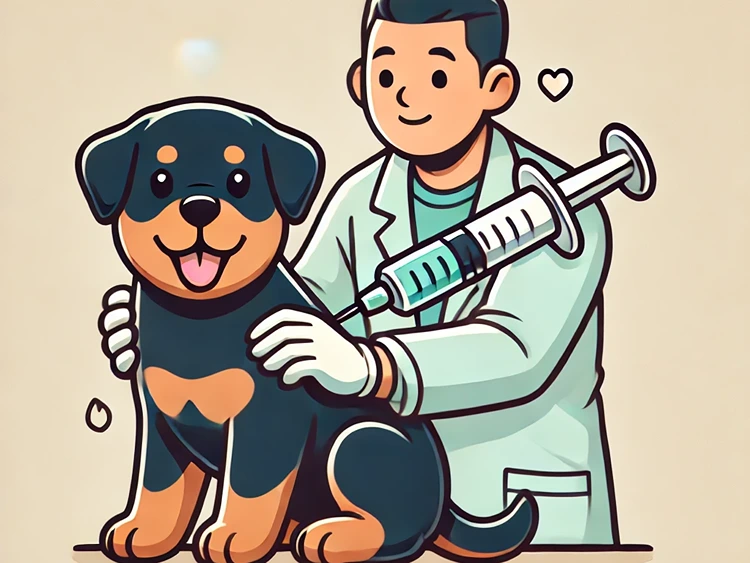Finding a reputable Rottweiler breeder who offers health-certified puppies is a crucial step in ensuring you bring home a healthy and well-bred companion. Rottweilers are a powerful and loyal breed, but like all dogs, they can be prone to certain health issues. Choosing a breeder who prioritizes health testing can help reduce the risk of genetic problems and give you peace of mind. This article will guide you through the process of finding Rottweiler breeders with health-certified puppies, ensuring you make a well-informed decision.
Why Health Certification Matters
Health certification is a key indicator that a breeder is responsible and dedicated to the well-being of their Rottweiler puppies. Health tests can screen for common genetic conditions such as hip dysplasia, elbow dysplasia, and various heart conditions, which Rottweilers are susceptible to. By choosing a breeder who conducts these tests, you can significantly reduce the risk of your puppy developing these issues later in life.
What Does Health Certification Include?
Health certification typically involves several tests conducted by a veterinarian to assess the genetic and overall health of the breeding pair. For Rottweilers, common certifications include:
- **Hip Dysplasia Certification:** Ensures that the dog’s hip joints are properly formed, reducing the risk of arthritis.
- **Elbow Dysplasia Certification:** Evaluates the elbow joints to prevent future mobility issues.
- **Heart Health Certification:** Checks for congenital heart defects, which can be prevalent in Rottweilers.
- **Eye Certification:** Screens for hereditary eye diseases that could affect vision.
These certifications are often provided by reputable organizations such as the Orthopedic Foundation for Animals (OFA) or the Canine Eye Registration Foundation (CERF). When looking for a breeder, it’s essential to ask for documentation of these health certifications.
Paw-some Tip:
Always ask the breeder for copies of health certifications before making a commitment. Legitimate breeders will be happy to provide this information and explain the significance of each test.
Where to Begin Your Search
Finding a breeder with health-certified puppies can seem daunting, but with the right approach, you can find a trustworthy source. Start by researching breeders online, but be cautious—just because a breeder has a flashy website doesn’t mean they’re reputable. Look for breeders who are members of recognized breed clubs, such as the American Rottweiler Club (ARC) or the American Kennel Club (AKC).
Reputable Breeder Directories
One of the best places to start your search is through breeder directories affiliated with breed-specific clubs. These directories often have strict membership requirements, ensuring that the breeders listed are committed to the health and well-being of their dogs. Some reputable directories include:
- **American Rottweiler Club Breeder Directory:** A great resource for finding ARC-approved breeders who adhere to ethical breeding practices.
- **AKC Marketplace:** Lists AKC-registered breeders, many of whom conduct health testing and adhere to the breed’s standard.
- **Orthopedic Foundation for Animals Breeder Referral:** Connects you with breeders who prioritize genetic health testing, ensuring the puppies are free from common hereditary conditions.
Using these directories can help you narrow down your options and find a breeder committed to health and quality.
Visiting Dog Shows and Events
Another effective way to find reputable Rottweiler breeders is by attending dog shows and events. These gatherings provide an opportunity to meet breeders in person, observe their dogs, and ask questions about their breeding practices. Dog shows often attract breeders who are passionate about the breed and committed to maintaining high standards.
Rottie Stats:
Over 75% of reputable Rottweiler breeders are involved in dog shows or breed-specific events, showcasing their dogs’ qualities and promoting responsible breeding practices.
Evaluating Breeders: What to Look For
Once you’ve identified potential breeders, it’s time to evaluate them more closely. Not all breeders are created equal, and it’s important to ensure that the breeder you choose is ethical, knowledgeable, and truly cares about the puppies they produce.
Questions to Ask a Rottweiler Breeder
When contacting a breeder, prepare a list of questions to help assess their commitment to the health and well-being of their puppies. Consider asking the following:
- **What health tests do you perform on your breeding dogs?** A responsible breeder should perform tests for hip dysplasia, elbow dysplasia, heart conditions, and eye diseases.
- **Can I see the health certifications for the parents?** Genuine breeders will provide documentation proving their dogs have passed the necessary health tests.
- **How do you socialize your puppies?** Early socialization is crucial for developing a well-rounded adult Rottweiler.
- **What support do you offer new owners?** Reputable breeders are often willing to provide guidance and support as you raise your puppy.
The breeder’s responses to these questions can give you valuable insight into their practices and priorities.
Red Flags to Watch Out For
Be aware of certain red flags when evaluating breeders. These warning signs may indicate that a breeder is not operating with the best interests of the puppies in mind:
- **No health certifications:** If a breeder cannot provide documentation of health tests, this is a major red flag.
- **Large-scale breeding operations:** Beware of breeders who seem to have an excessive number of litters available at once; this may indicate a puppy mill.
- **Lack of transparency:** A reputable breeder will be open and honest about their practices, including any potential issues with the breed.
- **No opportunity to meet the puppies’ parents:** Seeing the puppy’s parents can give you an idea of the temperament and health of your future pet.
Avoiding breeders with these red flags can help you find a healthy, well-adjusted Rottweiler puppy.
The Cost of a Health-Certified Rottweiler Puppy
Health-certified Rottweiler puppies can come with a higher price tag, but it’s important to understand that this cost reflects the breeder’s investment in health testing, quality care, and responsible breeding practices.
What Influences the Cost?
Several factors contribute to the cost of a health-certified Rottweiler puppy:
- **Health Testing:** The cost of genetic testing and veterinary care is significant, and reputable breeders include these expenses in the price of the puppy.
- **Breeding Quality:** Breeding dogs that meet the breed standard and pass rigorous health tests are often more expensive, which is reflected in the price of their puppies.
- **Socialization and Care:** Puppies that are raised in a healthy, stimulating environment with proper socialization are likely to be better adjusted and healthier overall.
- **Registration and Pedigree:** Puppies from AKC-registered litters with a strong pedigree often come at a premium.
How to Verify Health Certifications and Breeder Credentials
Once you’ve identified a breeder who claims to offer health-certified Rottweiler puppies, it’s crucial to verify their credentials and the authenticity of the health certifications. This step ensures that you are dealing with a legitimate breeder who prioritizes the health and well-being of their puppies.
Checking Health Certifications
Ask the breeder to provide copies of the health certifications for the parent dogs. These documents should be issued by reputable organizations, such as the Orthopedic Foundation for Animals (OFA) or the Canine Eye Registration Foundation (CERF). Here’s how you can verify these certifications:
- **Contact the Issuing Organization:** Reach out directly to the organization that issued the certification to confirm its validity. Many organizations offer online verification tools.
- **Check the OFA Database:** The OFA maintains a public database where you can search for dogs by their registration number or name to view their health certifications.
- **Request Recent Certifications:** Health issues can develop over time, so ensure that the certifications are recent and up-to-date.
Verifying these details can help you avoid breeders who may falsify documents or fail to update their certifications.
Researching Breeder Reputation
Beyond health certifications, it’s important to assess the breeder’s overall reputation. This includes looking into their history, practices, and how previous buyers perceive them. Here are a few strategies:
- **Read Reviews and Testimonials:** Look for reviews from previous buyers on platforms like Google, Facebook, or breed-specific forums. Positive reviews from satisfied customers can indicate a trustworthy breeder.
- **Ask for References:** Reputable breeders should be willing to provide references from past buyers. Contact these references to ask about their experiences with the breeder.
- **Check Breeder Club Memberships:** Membership in organizations like the American Rottweiler Club (ARC) or the American Kennel Club (AKC) often signifies adherence to strict ethical standards.
- **Visit the Breeder’s Facility:** If possible, visit the breeder’s facility to see firsthand how the dogs are cared for. This can give you a sense of the breeder’s commitment to their animals’ well-being.
Taking the time to thoroughly research a breeder can make a significant difference in the long-term health and happiness of your Rottweiler puppy.
Typical Timeline for Health Certifications in Rottweiler Puppies
| Age | Health Certification Milestones |
|---|---|
| 6 Weeks | Initial veterinary check-up and first vaccinations. |
| 8-10 Weeks | Second round of vaccinations, initial hip and elbow evaluations. |
| 4-6 Months | OFA preliminary hip and elbow testing, heart check-up. |
| 12 Months | Full OFA hip and elbow certification, eye examination. |
What to Expect When Visiting a Breeder
Visiting a breeder in person is one of the best ways to assess their operation and ensure they are responsible and ethical. During your visit, pay attention to the cleanliness of the facility, the condition of the dogs, and the breeder’s willingness to answer your questions.
Key Observations During Your Visit
Here’s what to look for when visiting a Rottweiler breeder:
- **Cleanliness and Organization:** The breeder’s facility should be clean, well-maintained, and organized. Dogs should have access to clean water, proper shelter, and enough space to move around.
- **Health of the Puppies:** Observe the puppies’ behavior and physical condition. They should be active, alert, and well-groomed. Check for signs of illness, such as discharge from the eyes or nose, lethargy, or visible injuries.
- **Interaction with the Breeder:** A responsible breeder will be happy to answer all your questions, provide documentation, and allow you to meet the puppy’s parents. They should show genuine concern for the puppies’ welfare and ask you questions to ensure their puppies are going to a good home.
- **Socialization Practices:** Ask the breeder how they socialize their puppies. Early socialization is critical for developing a well-rounded adult Rottweiler, so it’s important to see evidence of positive interactions with humans and other animals.
A positive experience during your visit is a good indicator that the breeder is committed to raising healthy, well-adjusted Rottweiler puppies.
Paw-some Tip:
Take note of how the breeder interacts with the dogs. A breeder who truly cares about their animals will display warmth, patience, and attentiveness, which are key signs of a responsible breeder.
Common Health Issues in Rottweilers and How Health Certification Helps
Rottweilers, like many purebred dogs, are susceptible to certain genetic health conditions. Health certification helps mitigate the risk of these issues by ensuring that the breeding pair is free from hereditary problems.
Understanding Rottweiler Health Risks
Rottweilers are prone to a few specific health issues, including:
- **Hip Dysplasia:** A common condition in large breeds, hip dysplasia occurs when the hip joint doesn’t fit properly, leading to arthritis and mobility issues.
- **Elbow Dysplasia:** Similar to hip dysplasia, this condition affects the elbow joints and can result in pain and lameness.
- **Heart Conditions:** Rottweilers are at risk for heart problems such as aortic stenosis, a condition where the heart valve narrows, leading to heart disease.
- **Eye Diseases:** Progressive Retinal Atrophy (PRA) and cataracts are common eye conditions in Rottweilers that can lead to vision loss.
Choosing a breeder who conducts thorough health testing can significantly reduce the likelihood that your puppy will inherit these conditions.
How Health Certification Protects Your Puppy’s Future
Health certification ensures that the breeding pair has been tested for these and other genetic conditions, reducing the risk that the puppies will inherit them. This not only protects your puppy’s health but also contributes to the overall health of the Rottweiler breed by encouraging responsible breeding practices.
The Role of Early Socialization in Puppy Development
Beyond health certification, early socialization is a critical aspect of raising a well-rounded Rottweiler. Socialization involves exposing your puppy to a variety of experiences, environments, and people, which helps them develop into a confident and well-behaved adult.
Why Socialization Matters
Proper socialization can prevent a range of behavioral issues, including aggression, fearfulness, and anxiety. By introducing your puppy to new experiences in a controlled and positive way, you help them learn how to navigate the world without fear or aggression.
How Breeders Contribute to Socialization
Responsible breeders start the socialization process early, often beginning when the puppies are just a few weeks old. This can include:
- **Exposure to Different People:** Introducing the puppies to a variety of people, including men, women, and children, helps them learn to be comfortable around humans.
- **Exposure to Other Animals:** Allowing the puppies to interact with other dogs and animals teaches them how to communicate and behave appropriately.
- **Introducing New Environments:** Taking the puppies to different areas of the home, yard, or even outside trips helps them become adaptable and confident in new surroundings.
When choosing a breeder, ask about their socialization practices to ensure your puppy will have a solid foundation for healthy behavior.
Rottie Stats:
Rottweilers who undergo early socialization are 60% less likely to develop behavioral issues, according to a study conducted by a leading canine behaviorist.
Making the Final Decision: Choosing the Right Breeder
After researching and visiting breeders, you should have a shortlist of potential options. Making the final decision can be challenging, but it’s important to choose a breeder who aligns with your values and priorities, particularly when it comes to health and socialization.
Weighing Your Options
Consider the following factors when making your final choice:
- **Health and Genetic Testing:** Has the breeder provided clear and verifiable health certifications for the parents? This is non-negotiable.
- **Breeder Reputation:** How did the breeder respond to your questions? Were they transparent, knowledgeable, and passionate about Rottweilers?
- **Socialization Practices:** Does the breeder emphasize early socialization? Are the puppies raised in a stimulating and nurturing environment?
- **Personal Connection:** Trust your instincts. Did you feel comfortable with the breeder? Did they show genuine concern for the well-being of their puppies?
Making a decision based on these factors will help ensure you bring home a healthy, happy, and well-adjusted Rottweiler puppy.
FAQs
Wrapping Up
Finding a reputable Rottweiler breeder with health-certified puppies is a crucial step in ensuring you bring home a healthy, well-adjusted companion. By focusing on health certifications, breeder reputation, and early socialization practices, you can make an informed decision that supports the long-term well-being of your Rottweiler. Remember, investing time and resources into selecting the right breeder pays off in the form of a loyal, healthy, and happy dog. Continue your research, ask the right questions, and trust your instincts as you embark on this rewarding journey.




